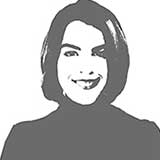The Generation that Finished Learning Analogically but Started Doing Business Digitally
My name is Nerea Luis, I am 29 years old, and I hold a doctorate in Artificial Intelligence. During my short professional career, I’ve spent several years working in academia as a training researcher and teacher. I´ve been in the world of industry for just over a year, where coming across leaders is much more common.
Being a woman and working in technology, it i’s probably hard for you to imagine me as one of those “stereotypical leaders,” the kind that unconsciously comes to mind when somebody mentions the term. For that very reason, I want to tell you a little about myself, my generation, and the leadership profile I most identify with.
I was born in the early 90s’ and belong to that generation of young Spaniards who have received the best training (public, in my case) in my country’s recent history. In turn, I’ am also part of the generation that -– halfway through our time at university -– suffered the consequences of an economic crisis that destroyed the hopes and dreams of many families.
If I stopped here, the story would not inspire hope at all. However, I feel very fortunate to belong to the last generation that knew and experienced the “‘analog”’ world, as well as to be one of the first generations to live and shape the digital one: The iInternet. My generation is undoubtedly affected by this change, and it has been very positive.
Personally, I would not be who I am today without the iInternet, and there is even less of a chance that I would have chosen a professional career in technology. Nor would I have embarked upon my own project; I’m almost certain of that, as my immediate family had no history of setting up businesses. What I’ve not yet told you is that the iInternet helped me create my first website (including a community) in secondary school. Later on, at university, I cofounded the annual technology event T3chFest, which welcomes over 2,000 attendees and 90 speakers every year.
All these moments awoke an entrepreneurial spirit in me, one that had not existed until then. The curiosity I’d always shown since I was little blossomed and became a desire to embark on projects that used technology as a tool. I believe one of the characteristics of a “future leader” is the ability to be an entrepreneur and create something while thinking about a diverse and global audience. The next step is to harness the iInternet to shape the process and, finally, enrich ourselves through technology to obtain data, as this can help us, measure and thus make less-biased decisions. There’s something else, though, and that is losing any sense of belonging to one specific physical place. Many of us consider ourselves digital nomads; who can do our jobs perfectly with a laptop, a smartphone, and little else. In fact, the teams of people we work with may be spread out over different cities, or even different countries.
Since I left my research work behind me to start a professional career in business, I’ve returned to working in a team outside the university teaching field. From that point of view, a leader, for me, is someone capable of extracting all the individual potential of each member of their team while successfully combining everyone’s skills so the members complement one another, develop professionally, and grow in a diverse environment, without egos. There are few things as beautiful in the working environment as seeing someone grow professionally, even more so if you were able to mentor them.
I’d like to think that talking about new “future leaders” will help open people’s minds and shine a light on the fact that not all leaders wear a suit or are successful 20-something entrepreneurs who left school early to work in Silicon Valley. Other sides, other profiles, need to be shown, and we need to value those who foster team-based learning.
Exceptional things have happened to me over the last eight years thanks to the mentoring I received, mostly from women in the technology and academic sectors. This article is also a way of thanking all of them, for what they bring to the world and for what they gave me in particular. Having new role models who inspire you and who you see yourself reflected in as a woman and as a professional helps you recognize yourself (in time) as a leader when you manage teams, lead projects, or nurture new ideas. But I won’t lie to you. On a personal level, it is a journey that cost me 10 years of my life. It was worth it though. Recognizing new leaders will undoubtedly boost entrepreneurship among women and eliminate gender inequalities once and for all.
Finally, to conclude this article, I hope my generation is the one responsible for continuing to define and improve the human-machine relationship without forgetting what it is that makes us human. Human inference and interpretation, taken together, give us the tools we need to create, come up with ideas, and investigate (among other things). If we add technology and Artificial Intelligence to that equation, we have an opportunity to enhance a product, process, service, or even entire field of knowledge in our hands. We need to understand which parts we leave to the machines and which part we do ourselves,; and then work together.
